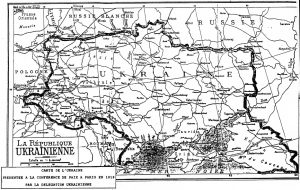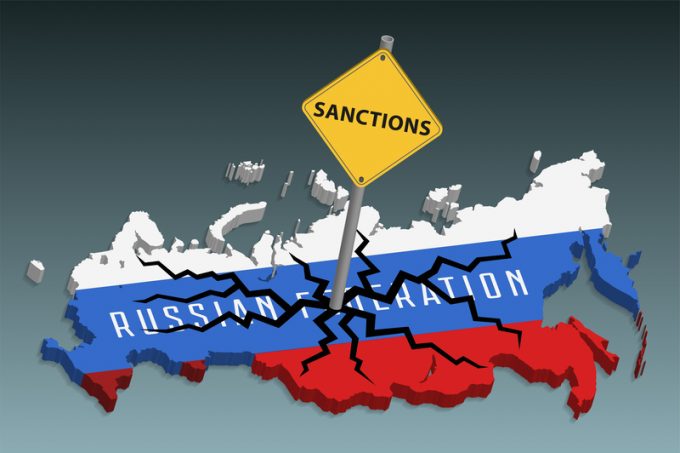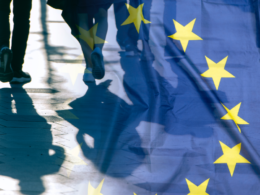Historically, Ukraine is not exceptional, but it is "hyper typical" of major trends in the last 100 years, states Snyder. He points out three moments of the 20th century and reveals how they are connected to Ukrainian history:
- Ukraine's failure to establish a nation-state after the First World War was actually typical of the European interwar national states, which all lasted for under 20 years.
- From the perspective of Ukraine, the aspirations and the consequences of the neo-Imperial policies by Nazi Germany and the USSR come clearest.
- If the true purpose of the EU is to rescue post-imperial states, then the Maidan Revolution makes perfect sense.
Ukraine between two neo-empires
Map of Ukraine presented by the Ukrainian delegation at the Paris Peace Conference in 1919.
After the Bolshevik Revolution of 1917 in the old Russian Empire, the civil wars fought on the territory of the old Russian Empire were fought centrally in Ukraine.
“If you are a Soviet state builder, Ukraine is the major national problem that you are confronted with in the 1920’s,” states Professor Timothy Snyder. “If you are Stalin…Ukraine is a critical - if not the critical - place of revolution, where collectivization will fail or succeed,” Snyder goes on.
Ukraine is where the policies of Germany and Russia, the two neo-empires of the 1930’s-1940’s, coincided. To succeed, Germany and Russia both needed to have control of the grain stocks in Ukraine and to take possession of Ukraine’s fertile black earth.
For Ukraine, the encounter with the two new empires was especially disastrous. An estimated “3 to 4 million people starved between 1932-1933… another 3 million were killed during the German occupation of whom more than half were Jews, and another 3 million or so inhabitants of Soviet Ukraine died as Red Army soldiers. There is no event of this scale in any other country in the world,” Snyder claims. Ukrainians paid “a terrible, terrible price.”
Nation-states in Europe
The short existence of the post-imperial nation-states in Europe was a rule.
According to Snyder, Europe never had any nation states
. There were empires and then the collapse of empires, followed by a bailout integration project, the European Union.
In Eastern Europe, there were nation-states, they just didn’t last long. "And if you look at it from your national point of view, you don’t draw any lessons, you just say you didn’t last long because the outsiders were evil, but if nobody lasted for long it can’t just be that the outsiders are evil, it has to be a systemic problem. East Europeans, by not considering it in a systemic way, are making a big mistake,” says Snyder.
February 1918 article from The New York Times showing a map of the Russian Imperial territories claimed by Ukraine People's Republic at the time, before the annexation of the Austro-Hungarian lands of the West Ukrainian People's Republic. Source: http://nyti.ms/1Osuvr3
The first European nation-states such as Serbia, Greece, Bulgaria emerged in the late 19th century in the Balkans as a result of the anti-colonial movements against the Ottoman Empire. After the First World War, the political philosophy of the independent nation-states extended to much of Eastern Europe so new states were created out of the territories of the former European land empires. All such nation-states failed fast, they existed from a few years like Ukrainian and West-Ukrainian National Republics, up to 20 years like other new post-war states such as Austria, Czechoslovakia, Lithuania, Latvia, Estonia.
History amply demonstrates that nation-states always fail, Snyder continues. The West-Ukrainian National Republic and the Ukrainian National Republic that existed between 1918 and 1922 are “hyper typical” examples.
“History is…a horizontal process in which there are connections that we see if we look horizontally…rather than just looking up and down a national narrative,” he continues.
Snyder posits that “nation states can challenge an empire, they can even bring down an empire but they are incapable of providing an automatic replacement.”
Ukraine and EU
If the true purpose of the EU is to provide aid and support to the European state, then the Euromaidan protests in Kyiv made perfect sense, Snyder goes on. Turning to the EU for help, the Maidan
expressed what Ukraine was looking for: “Ukraine has a problem with the rule of law, and that is the essential problem of state building. [We] could use a little help from the outside…we’re hopeful that the Association Agreement with the EU will be a push in the right direction.”
“Global history only makes sense if we’re able to look both at Europe and beyond Europe at the same time…the convenient division between Europe and beyond Europe actually prevents us from seeing the things that are essential to Europe itself…to Europe’s great peril at this particular moment… Ukraine is so intensely typical, it is the place that allows us to see the general phenomenon whether it’s nations or empires, whether it’s the creation of new empires in Europe or whether it’s a European rescue of a nation-state,” told Snyder.
If the European Union is to survive, it must continue to “rescue [new] states…. once it stops rescuing states it will also stop rescuing the states that are its members.”
Read also: War against Ukraine is part of Russian policy to break EU apart, says historian Timothy Snyder
Read also:
- War against Ukraine is part of Russian policy to break EU apart, says historian Timothy Snyder
- History as a weapon in Russia’s war on Ukraine
- History, Identity and Holodomor Denial: Russia’s continued assault on Ukraine
- Timothy Snyder: Yes to security in Europe
- Nazi dreams of an enslaved Ukraine: the blind spot of Germany’s historical memory – Timothy Snyder
- Timothy Snyder: Ukraine is but one aspect of a much larger strategy that threatens European order
- Memory of the Great Patriotic war in Russia’s expansionist policy







